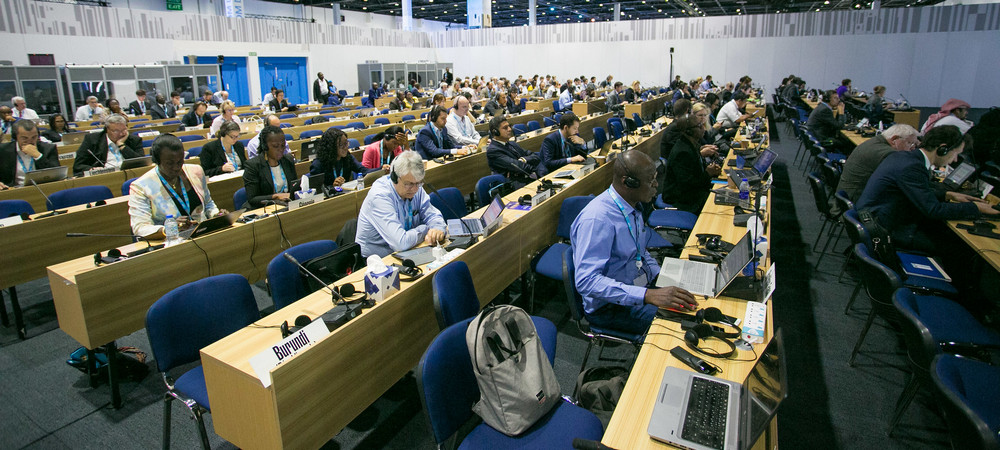
What you need to know ahead of PP-22
The Plenipotentiary Conference is the highest-level meeting of the International Telecommunication Union (ITU). It serves as the authoritative decision-making mechanism on the organization’s strategic and financial plans, leadership, and overall direction.
Held every four years, the Plenipotentiary Conference (known informally as “Plenipot” or “PP”) selects the top management for the ITU Secretariat, sets out key strategic objectives, and affirms common positions among ITU Member States worldwide.
When ITU’s Member States convene in Bucharest, Romania, for PP-22 between 26 September and 14 October 2022, they will set out the organization’s roadmap for 2024-2027.
In the wake the COVID-19 pandemic, PP-22 comes at a time when information and communication technologies (ICTs) are transforming economies, societies, and people’s lives worldwide.
The 2022 event should also create a new benchmark for a green, gender-responsive, inclusive, and sustainable Plenipotentiary Conference.
International platforms and mechanisms
ITU’s Plenipotentiary Conference is an international treaty conference. It considers and may amend the organization’s basic texts – such as the ITU Constitution and Convention, General Rules of Conferences, and protocols for dispute settlement – as well as making key strategic and budgetary decisions.
Fundamentally, ITU works for its membership to ensure the coordination and harmonization of radio frequencies and satellite orbits, develop telecommunication standards, and promote worldwide telecommunication development.
ITU encompasses a diverse global membership of 193 Member States and over 900 sector members, comprising private companies, universities, institutes, and other regional and international organizations. ITU has a federal structure with three sectors: Radiocommunication; Telecommunication Standards; and Telecommunication Development. Each sector has its own governing body, with a corresponding bureau headed by an elected official in the ITU Secretariat.
As one of 15 specialized agencies in the United Nations system, ITU fosters international cooperation to accelerate the world’s digital transformation in line with the UN Sustainable Development Goals (SDGs). Collectively, ITU members are committed to connecting the world and promoting ICTs for the good of all.
Selecting ITU’s leadership
At PP-22, as at every ITU Plenipotentiary, ITU Member States will
elect:
- The 48 Member States among them to sit on the next ITU Council, the organization’s governing body during the four-year period between Plenipotentiary Conferences.
- ITU’s next management team, consisting of the Secretary-General, Deputy Secretary-General, and Directors of the Radiocommunication, Telecommunication Standardization and Telecommunication Development bureaux.
- The 12 members of the Radio Regulation Board, which meets up to four times yearly in Geneva, Switzerland, to guide the ITU Radiocommunication Bureau in applying the ITU Radio Regulations, registering Member States’ frequency assignments, and addressing cases of unresolved interference.
Setting out the vision for the next four years
PP-22 will take stock of the progress on ITU’s Connect 2030 Agenda, which aligns digital transformation and ITU work with the UN 2030 Agenda and SDGs, based on the central promise of leaving no one behind.
PP-22 is also expected to adopt the ITU Strategic and Financial Plans for 2024-2027, defining ITU’s overarching priorities for the next four years and the financial resources available to achieve key deliverables.
What happens in between Plenipotentiary Conferences
The ITU Council oversees subsequent implementation, with delegates meeting once yearly to ensure adherence to the approved Strategic and Financial Plans, particularly as ITU responds continually to the fast-evolving global telecommunications and ICT environment.
See the earlier Strategic and Financial Plans adopted at PP-14 and PP-18.
The Council takes all steps necessary to help implement decisions and resolutions from Plenipotentiary Conferences and other ITU meetings. It also supports the implementation of provisions of the ITU Constitution and Convention and key administrative regulations – namely, the International Telecommunications Regulations and the Radio Regulations.
The Council sets up specialized Working Groups to deal with specific issues as needed.
Last update: April 2022
